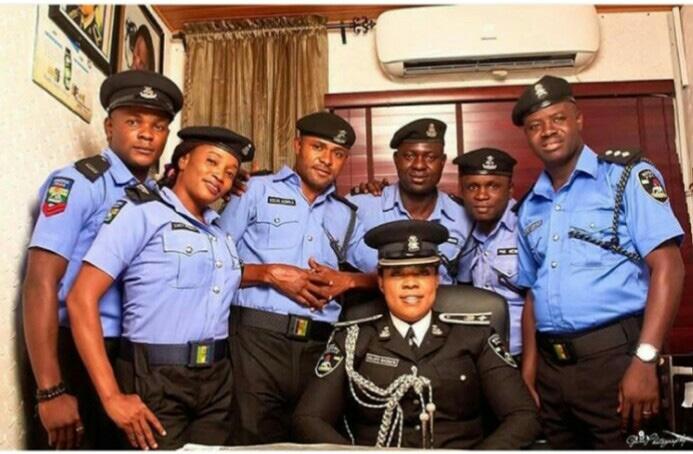
There is a healthcare establishment in the United Kingdom whose mission statement could be applied to the Nigeria Police. It reads: ‘Treat a person as they are and they will remain as they are, treat a person as they could be and they will become as they could be.’ The public perception of the Nigerian Police is laden with many negative views than positive ones. Remarkably, this is not just the case with the Nigeria Police but many other aspects of life. A Professor of Communications at Stanford University, Clifford Nass said, ‘Some people do have a more positive outlook, but almost everyone remembers negative things more strongly and in more detail.’ Nass goes on to explain that negative emotions generally involve more thinking and that the information is processed more thoroughly than positive ones because humans tend to ruminate more over and about unpleasant events and use stronger words to describe them.
If one takes time to brood over Clifford Nass’ words, there will be a realisation that Nigerians have mentally dwelt more on the unpleasant experiences they have had with the Police than the positive ones. But this is not limited to Nigerians. As observed from Nass’ study, it is a human phenomenon and there is no better example to cite than the recent case of the gruesome killing of George Floyd which was followed by mass protests that was calling for the removal of the Police in several American States.
Before pointing out the good sides of the Nigeria Police that have unwittingly been overlooked, it would be necessary to examine the Public Relations efforts of the Nigeria Police as carried out by the Nigerian Police Public Relations Department (NPPRD). A 2016 assessment of the NPPRD by Omolola Oluwasola, a Media and Communications Scholar, which was focused on the Lagos Command, states that ‘there is a serious need to reposition the public perception and image of the Nigerian Police Force….’ The psychology of perception refers to the ways in which people experience the world around them. It also includes how people interpret and respond to sensory information like sight, smell and hearing. When it comes to appealing to these senses, the media readily comes to mind.
While most people will insist that the media has mostly portrayed the Nigerian Police as all shades of wrong, they may not be mindful of the efforts of the Nigeria Police to connect with the public through Radio and Television programs. Two examples will suffice to drive this point. A little over two decades ago, there was a popular TV programme called ‘Crime Fighters’. This programme resonated with the public at the time because, not only did it showcase the efforts of the Police at nabbing criminals of all kinds, it was also used as a means for sensitising the public on matters relating to personal and communal security. On the network service of Radio Nigeria, a programme called Police Diary is aired weekly. In this phone-in programme the Police PPRO and other high-ranking officers of the force interact with callers who often call in to make complaints or call the attention of the police to security breaches in their vicinity.
In comparison to other military and para-military establishments in Nigeria, the Nigeria Police has proven to be more media-friendly and approachable. Many Nigerians can easily recall instances of seeing Inspectors-General of Police, their Commissioners and PPROs on various media platforms. This is not the case with the Nigerian Army, Navy or Air force, who are compelled to make appearances in response to some crises or allegations. No matter how good any organisation is, if their good works are not visible to the public, their image will be adversely affected. Whether one realises it or not, Nigerians tend to fraternise more with the Police in many ways than they realise – from the civilians who dwell in Police barracks, to people who use them to settle petty quarrels that could be resolved privately, and those who have accounts with the Police Microfinance Banks due to the peculiar incentives that they offer to their customers. On a social level, most people would comfortably chat with a police officer over drinks, and if the officer in question happens to be a beautiful lady, her uniform assumes the function of a prop in the drama of physical attraction. Many Nigerians will recall the incident of a young man who ‘dared’ to woo a female soldier because he found her attractive. What followed his ‘bold’ gesture was a litany of beatings and slaps accompanied with the traditional ‘frog jump’ that is aimed at breaking a person into submission.
Read Also: “We Are Back!”- The Nigeria Police Roars
Still on the media, the presence of the Nigerian Police on social media needs to be mentioned. In the ever fast-and-furious twitter ecosystem, the Complaint Response Unit (CRU) of the Nigeria Police has made significant impact. Their twitter handle, @PoliceNG_CRU which was set up since October 2015 has a following of 144,000. For a government establishment, this is impressive because the social media accounts of many government agencies have little following. Beyond the number of followers, the engagement with the public can be rated as ‘very good’. Their posts are recent and their response to complaints are prompt. Tracking numbers are given to complaints that are undergoing investigation. This ensures that these cases are followed up and tracked accordingly. Again, the twitter account of the Nigeria Police Force, @PoliceNG which has about 1.4 million followers acts as a verified source of information for matters relating to security, such as crime news, recruitment of Police Officers, Community Policing and other adjunct duties that fall under the purview of the Nigeria Police Force. The mere fact that the Nigeria Police has more following than the Nigerian Army shows that the Nigeria Police is making concerted efforts to increase friendly relations between the citizens and the force. This should not be surprising because one of their primary functions involves maintaining law and order in the society. Present realities demand that the information network that social media provides is necessary if law and order must be maintained.
Nigeria is a country where the gap between the haves and the have-nots is constantly widening. This kind of scenario is bound to produce a society where people’s lives are ‘nasty, brutish and short’ as Thomas Hobbes puts it. This nasty aspect of the Nigerian society features crimes like advanced free fraud. The Police Special Fraud Unit which is a section of the Force Criminal Investigation and Intelligence Department, has used their expertise in forensic investigations to unravel cases of financial crimes involving the popular 419 scam and yahoo yahoo imbroglio. While many people may rightfully disagree that the PSFU has recorded any significant number of successes, there are also some other Nigerians who will recall the heroic feats of the PSFU in helping them recover money that had been swindled from them.
Be it the case of paying rent to a fictitious landlord or caretaker or recovering funds stolen by employees of banks or corporate organisations, those who have been fortunate to retrieve their funds will think otherwise if they are told that the PSFU is not effective.
The Force Criminal Investigation and Intelligence Department has also been effective in curtailing the activities of kidnappers and ritualists across Nigeria. In 2017, the media was awash with the case of Chukwudumeme Onwuamadike also known as ‘Evans’ who was apprehended by the Intelligence Response Unit of the Inspector-General of Police. Evans who was reported to have carried out kidnapping operations for five years met his waterloo over his alleged attempt to kidnap the Chairman of a popular transport company in Nigeria. Many others like Evans have been stopped in their tracks by the police as will be attested to by Crime correspondents in many Nigerian media houses.
The involvement of the Nigeria Police In international peacekeeping operations dates back to 1960 when police officers were deployed to Congo, now known as the Democratic Republic of Congo. According to Okechukwu Innocent, Nwachukwu Tochukwu, Ugwu Christian and Obioji Josephine in their 2017 journal article titled ‘The Role of the Nigeria Police Force in Peacekeeping Operations,’ it was in June 2004 that the Nigeria Police deployed its first-ever Formed Police Unit (FPU) to the United Nations Mission in Liberia. The FPU was a special, fully armed and equipped operational contingent made up wholly of Police Mobile Force units. They stated further that Nigeria became the first country in Africa to contribute FPUs to UN peacekeeping operations. The exemplary performance of the inaugural Nigerian FPUs provoked the UN to demand the deployment of more Nigerian units to other mission area. What this shows is that some of the limitations of the Nigeria Police are connected with inadequate funding and public acknowledgement of their contributions to nation-building.
Globally, murder cases are usually hard knots to untie. The perpetrators of this act always do all that is within their power to cover their tracks, thereby sending police officers on a wild goose chase. To buttress this point a bit further, a little digression into the make-believe world of movies will be necessary. A Nigerian film titled 1960 reels out a vivid narrative of a principled police officer, Inspector Danladi who was assigned to unravel a case involving the killing and raping of women in a particular South-Western town set in pre-independence Nigeria. When the Inspector eventually discovers the perpetrator of these acts of rape and murder, he is unable to prosecute him because the person in question happens to be a prince and heir to an influential King. Eventually, an innocent driver is arrested and the real killer escapes arrest. The point of this narrative is that the police can solve murder cases if they get cooperation from the public and fellow officers alike. In a country where justice is only served to the rich and influential, there is not much that the police can do. With the exception of politically motivated murders, the Nigeria Police Force has its fair share of successes. Sometime in April 2020, the Surulere Police Station in Ilorin, Kwara State solved a murder case due to the information provided by an anonymous stranger. Another example that most Nigerians will remember was the role of the Nigerian Police in solving the kidnap and eventual murder of Cynthia Osokogu, a woman who was stalked on Facebook, lured from her residence in Abuja to a Lagos hotel and murdered. It took the investigation and intelligence of the Area E Command in Festac, Lagos State to nab the culprits.
The Federal Supreme Court, High Courts and Magistrate courts across various jurisdictions in the country have records of murder cases that have been solved. The peculiarity of homicide cases is such that the victims and their loved ones do not like to relive the memories of the circumstances surrounding the death of their loved ones. This is especially the case in Nigeria where matters of death are treated as a private or family affair.
Are there good police officers? Even those who are quick to label the Nigeria Police Force as bad will acknowledge that there are good ones. They may also add that one or a few trees do not make a forest. True as this saying is, there are certain trees whose fruits produce other trees of their kind. There are many police officers whose exemplary performance and conduct have inspired Nigerians and given them a reason to hope for a better country. However, space and time will limit this discourse to two examples. For the sake of gender balance, a male and female officer will be profiled and brought to the fore.
Muhammad Wakili, a retired Police Officer andformer Commissioner of Police in Kano State is exemplary for his dedication to curbing crime and the abuse of hard drugs. This passion had earned him the nickname Singham, a name derived from an Indian movie character. All through his time with the Police, he earned a reputation as a no-nonsense man of good character and indomitable will.
Josephine Okeme is also a rare Police Inspector knownfor her exceptional performance as a traffic controller in the Yaba axis of Lagos State. This woman, who has graced the January 2018 edition of a magazine has been described by many Lagos residents as the ‘Traffic Control Queen’. Her commitment and dedication to controlling traffic at the Sabo Yaba, a duty she carries out with smiles, endeared her to motorists and commuters who hardly drive past without giving her a wave or thumbs up. In addition, she has won several awards which include JCI-Lagos Awa Da, Metropolitan 2017 Toppa award and GTBank Nominate a Champ 2017 award.
While there are other officers who may not have been noticed by the public, these two officers are symbolic of the pride that can be attached to the Nigeria Police. They are good police officers who reflect the goodness and greatness that is inherent in every Nigerian. While this treatise does not aim to deny the shortcomings of the Nigeria Police, it aims at reminding the public that the police is like that friend that everyone runs to when trouble comes. Everyone can attest to that one person that everybody runs to whenever there is an issue to resolve. That person may not be described as a best friend but the person may have some level of influence that can mediate in matters of conflict. This is the position that the Nigeria Police occupies in Nigeria. If Nigerians take some time to think, they will realise that the Police have been a friend at one point in time or the other.
Nigerians must remember that whatever we call the police is what we really are. Every police officer is a father, mother, husband, wife, friend, uncle, aunty, boyfriend, girlfriend, fiancé, fiancée, and so on. They should remember that there are some spouses who sleep alone at night because their other half has to serve and protect other citizens. They must realise that when they feel the heat of the sun and the chill of the night, there are police officers at junctions, street corners and expressways bearing the discomfort on their behalf. Before a bad tag is append to the police, let us put ourselves in the position of their immediate and extended family members and feel the pain of being publicly scorned, disrespected or disregarded.
There are some police officers that the public will not notice. The ones who judiciously keep files and documents in the office. The ones who console sobbing women who have been victims of domestic violence, or the ones who have done heroic feats like fishing out pedophiles. Victims of car theft equally have stories of police officers who went beyond the line of duty to retrieve stolen vehicles that have been stolen, resprayed and refurbished. Little as these acts may seem, they mean a lot to the victims involved. The definition of a friend, for Nigerians, should not always be someone who smiles and makes merry with one at every given time. It should be a problem solver, who knows where the shoe pinches and how to save an honest Nigerian from a dishonest one, a law abiding one from a bully, and one who prevents harm before they happen to forthright persons in society.
Jude Nwabuokei is a writer, journalist and researcher.

